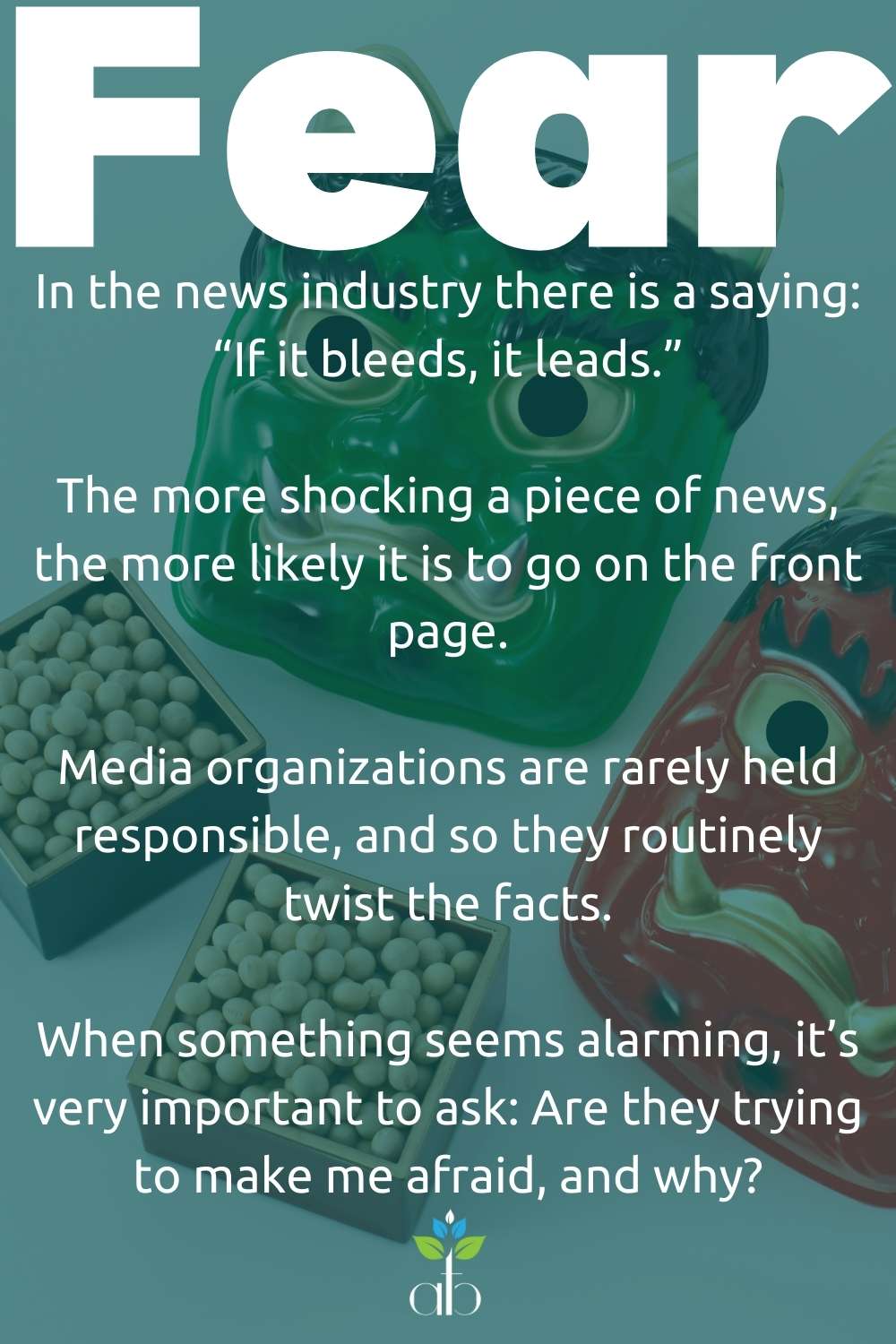Episode 474
Fear Is Here

Many people receive their view of the world primarily through television and news sites, without putting into context what the media is telling them. They may even have personal experience seeing the media lie about some subject they know well – but they don’t hold that in mind when they see the news talk about any other subject.
In media there still exists this saying “If it bleeds, it leads.” The most shocking, most sensational stories go to the front page, and if the news isn’t sensational enough, they may well change the title to make it seem more alarming.
In this age, it’s not just the news who twists the truth this way. There are even scientific papers which present a very uncertain conclusion in the paper itself, and a very different version in the abstract to show to the public.
When something seems alarming, it’s very important to ask: Are they trying to make me afraid, and why?
Hosts & Guests
Kurt Robinson
Transcript
Welcome, beautiful thinkers!
The title of this talk is fear is here.
I was thinking about so many things that happen on mass media.
Not a lot of people necessarily put these things into context.
When there are messages in mass media, there are several levels in which the mass media is engaging us.
Now to give a little backstory, there was this fellow named Edward Bernays.
I believe he was the grandson or the grand nephew of Sigmund Freud.
Likely a very intelligent man, a person looking at people’s underlying motivations, and perhaps questioning how these could be taken advantage of.
Now, in the United States, the government said, “Well, we have this problem.#
“A lot of people are getting a little worried about the threat of war.
And if we want to get along with the populace, if we want things to go smoothly, I think we need to calm them down.”
So they asked Bernays, “How can we calm down the people so we can move forward? Get through this crisis.”
And Bernay said, “No, you do not want to calm them down.
If you want to control people, increase their fear.”
There was the Cold War in the United States.
And you’d see these things like these clocks, the doomsday clock, and they tell us every night on the news or tell those people, those citizens every night on the news, what was going on?
And how close they were to midnight?
How close nuclear destruction was to eliminating them and every one of their family.
If not giving them radiation damage, mutilating them, many other horrific possibilities.
These are the kinds of things that people will talk about the mass media.
And the message, well, here’s the thing, we look at the message, sometimes we look at the literal words.
And the words, if we take them on their face value, without thinking about the context, then we don’t really know what they mean.
We know what people are presenting to us.
But we don’t know the deeper message.
We don’t have that deeper understanding.
So once on Facebook, I found this article was somebody talking about a certain virus was a mainstream media source.
It might have been the Sun or some UK newspaper.
And they were saying this first young lady, the first person under the age of 18, to be killed by this virus.
And I asked, posted this on Facebook and I asked people, what does this mean to you?
What is the thing that this article must mean?
If you think it through, and some people responded, saying, “Well, it’s the it’s the first young person that was killed by this virus.
And that means the virus is is really dangerous and can even kill young people.”
I say that’s interesting.
Actually, I would interpret it to mean the opposite.
This actually means the opposite of what it’s presenting.
Because this is news.
Now, when the sun rises every morning, that is not news.
When the sun sets every morning, that is not news.
When the clouds come out, well, okay, you have the weather report.
But basically, these things are not news because they happen all the time.
Now, if you do have something that does not happen frequently, that is what makes the news and especially if it’s something a little shocking, have this expression.
Many of you have heard, if it bleeds, it leads.
That is if it’s shocking.
If it evokes strong, negative emotions, it makes a headline, because it gets people to, well, once upon a time, buy those newspapers, or click on the link.
So you notice many times, as I’ve said before, you see the headline, read the article, the article does not align with what the headline says.
The headline is saying something quite different from what’s in the article.
The headlines normally written by the editors and the articles themselves, written by the journalist, at least that’s a common excuse.
Even I’ve seen this with scientific articles, we think we can trust scientific articles, well, sometimes.
But again, there must be a context.
They see this, the headline of the scientific article is actually quite descriptive and literal, saying what they’re doing about the effects of face masks, on health.
You read the abstract of the article and it says that any mask is better than nothing, even a cloth mask-
You read the actual article, you’ve got two abstracts, one for the public, and one that is actually included in the article.
This is the kind of deception that we face in our everyday lives.
And we see the different levels of communication.
So like I said, when I posted that article on Facebook, some people will just see, the literal level of the article, the literal interpretation.
Without wondering, “Well, for one thing, is it true? Is this and they portraying these events accurately? Is this one really happened?”
Those are questions we have to ask.
There are also other levels of communication, which we call sub communication.
Meta communication, meta communication is what we call the medium is the message.
So if you have somebody important, some professor who’s standing at the front of an auditorium, people know that he has a title, and he’s done research in the university.
And he starts to tell you a certain thing that carries weight.
That is part of the communication.
It’s saying this is authoritative.
You should believe this.
I know what I’m talking about.
Likewise, if it appears on the television, I guess it still escapes me a little bit why people think that this means authority.
But many people do assume this.
If it appears on the television presented as factual, then that means it is an authoritative source.
Which is, to me that seems a bit ridiculous.
But this is the world that many people have grown up in.
That was their only source of media or their only source of news for a long time.
So if the news says it, then, they believe it.
And the of course the the media do their best to play up to this.
They do their best to portray themselves as experts as authoritative.
They likely get coaching in speech patterns and these kinds of things.
So they can present themselves as authoritative.
So they seem like they know what they’re talking about, is kind of interesting, because if you think about a newsreader a lot of images, reading, just reading an autocue.
And they’ve given this very convincing, vocal tone that makes it seem like they know what they’re talking about sitting there in their suit and tie or their professional dress and relaying as to this information.
Perhaps even dispassionately, is probably part of the effect.
What’s the message then we get a lot of the time.
Other people are scared.
And you should be too.
But we don’t have to be scared.
These things happen.
There are a lot of bad things in the world that happen.
That’s that’s real, a lot of tragic things.
There is war murder in these things.
We also have the this bias, which is very important in the interpretation of the context.
To understand what the real message is.
One important bias is the availability bias.
So if we hear so many times on the news, that these things are happening, we hear that murder rates are increasing.
That is cartel violence, for example.
All kinds of things was that they tell us these things over and over.
And we listen to them over and over, which is our decision.
Then when somebody tells us something, for example, I tell people, I was reading that book by Steven Pinker, Better Angels of Our Nature.
And this is about the impressive, astounding decline in violence over time, I’d tell people about that.
I tell people how violence is declining.
And they say, No, that can’t be true.
Partly because they have this availability bias, the information that is available to them seems like the most salient in the most accurate, because I’ve heard something so many times.
That is what seems accurate.
Now, we’re all subject to this.
So on the other side, too, if it’ll always look at happy news, or maybe we’ll have a distorted image of how the world really is.
Or, you know, maybe just by looking at happy news, we get a more balanced view of the world, because so many people really want to scare us.
There must be some part of us that wants to be scared.
There was I think it came from a medium.
I can’t remember the name of the medium.
But this supposedly channeled source, like it’s somebody channeling this extraterrestrial being or this extra dimensional being, and saying,
“Hey, humanity has made it.
They’ve made it.
They’re already there.
They’re already living in this world of abundance, and community where most people are peaceful.
They’re already doing it.
And most, most people are good.
And most people want to help each other in various ways, and get along and cooperate and build value together and build projects and use their creativity and do all these wonderful things.
So we can all be involved in it.
The only thing holding them back is fear, this susceptibility to fear, their belief that there is always some tiger lurking around the corner.”
Maybe we’re already there, maybe we’ve already made it.
Now we let go of those things, which ones served us those beliefs, that they’re always predators.
We stay present.
We stay alert.
We can be aware of threats we need not be obsessed with them.
Let’s move forward.
And that’s why we might well do
if we just become aware of our own tendencies.
Aware of our own desire to be afraid.
And aware of those who attempt to lead us into that desire.
Have a wonderful day.

New Episodes Every Weekday
11am Mexico City time
10 min episodes Monday - Thursday
1 h interview episode on Fridays
As an Amazon Associate I earn from qualifying purchases.
Stay Beautiful &
Stay Connected
